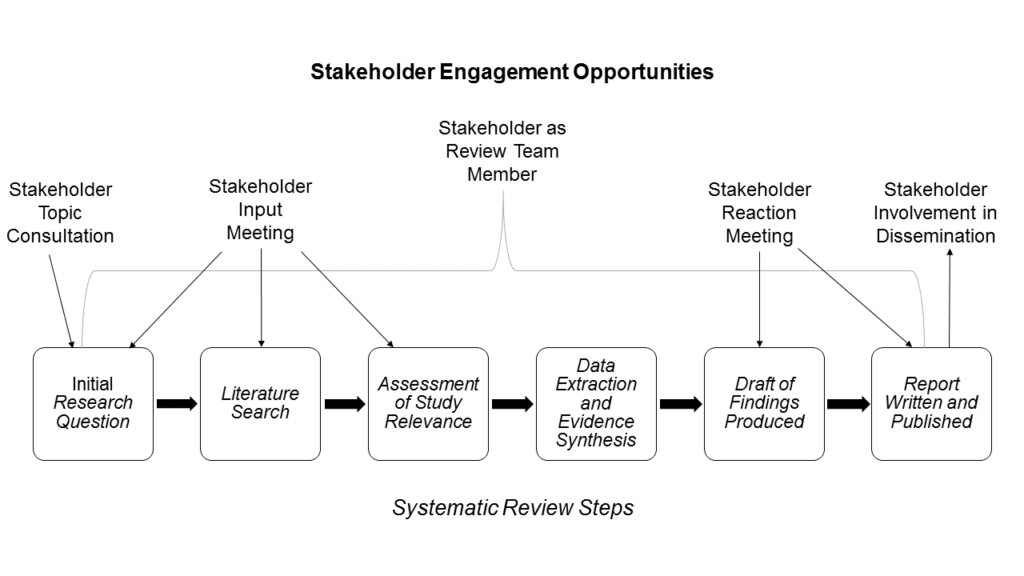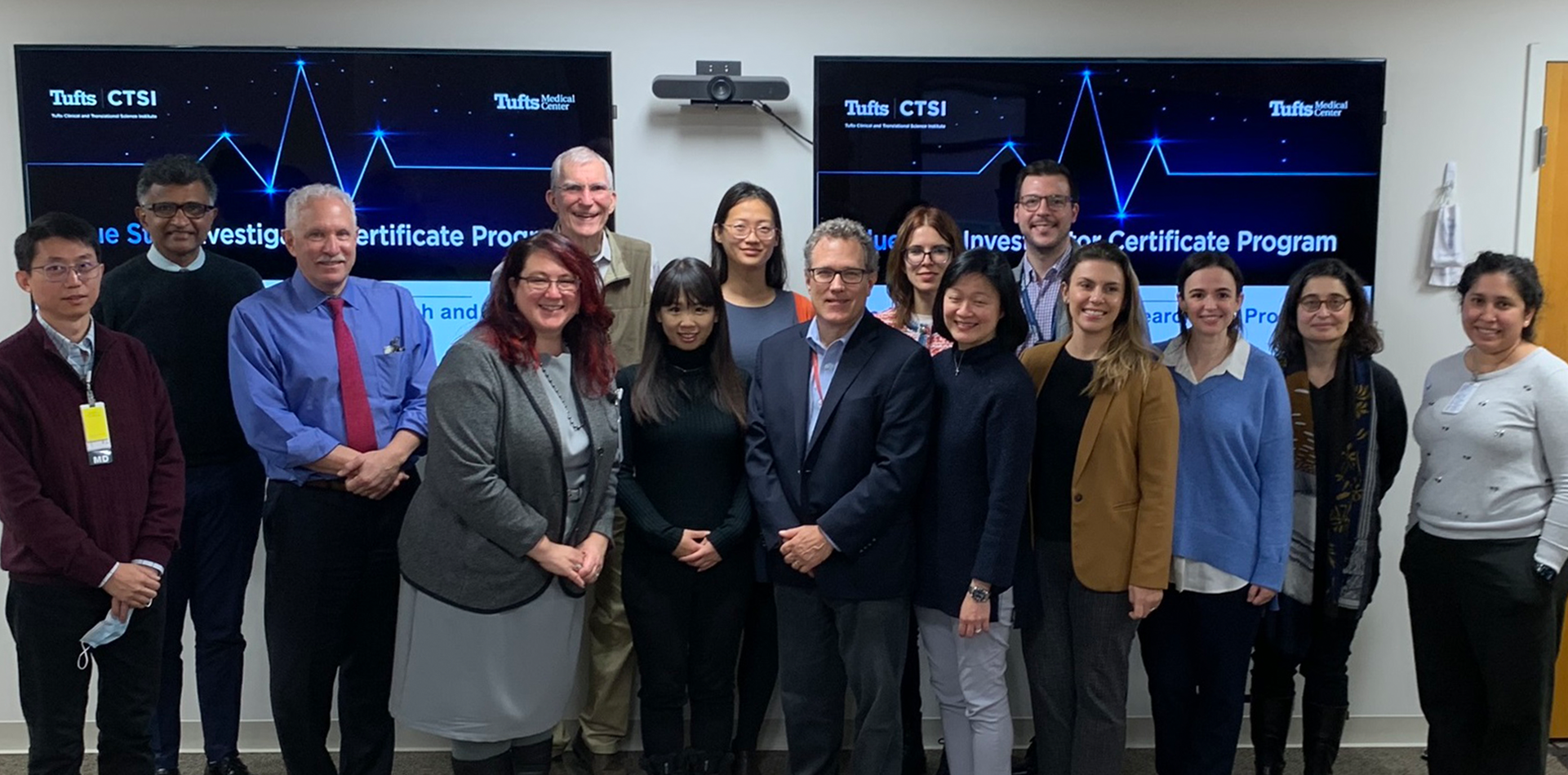Download a printable PDF of the Call for Authors here.
Overview
One of Tufts Clinical and Translational Science Institute’s aims is to cultivate broadly-engaged team science, actively including stakeholders, to promote relevant and impactful translation to diverse populations and across the lifespan. As part of this effort, we are developing a Handbook of Broadly-Engaged Team Science. You are invited to contribute to this important publication.
The Handbook will be a practical, easy-to-use guide for researchers and research stakeholders, written in non-technical language appropriate to a wide audience. It will support the advancement of broadly-engaged team science to improve the quality of clinical and translational research that ultimately improves the population’s health.
Broadly-engaged team science is a new and emerging concept. We are interested in working together with you to create a resource that helps others to understand this concept, jumpstart projects, and reduce barriers to implementing and advancing broadly-engaged team science.
Once completed, Tufts CTSI will publish the Handbook in a downloadable electronic (PDF) format available on the Tufts CTSI website. The Handbook will be disseminated free of charge throughout the Tufts CTSI network.
Who Should Contribute to the Handbook?
All are welcome to submit a proposal for Handbook. You do not have to be a researcher or scientist. Contributors might include clinicians, academics, community members, students, or scholars. Early-stage investigators’ insights are also welcome, including experiences related to the Tufts CTSI Pilot Studies or Community Health Catalyst Programs.
Why Should I Contribute to the Handbook?
Your unique perspective and expertise is invaluable. You may have:
- Hands-on experience with implementing research and evaluations involving the use of broadly-engaged team science.
- Developed or used innovative tools, techniques and resources that support broadly-engaged team science.
- Confronted conceptual and methodological issues in performing broadly-engaged team science.
- Managed and evaluated projects involving broadly-engaged team science.
The Handbook is an opportunity for you to share your knowledge, best practices, and lessons learned in a peer-reviewed publication that will be disseminated broadly.
Although Tufts CTSI is not able to pay for submissions, the potential rewards are great:
- Co-authorship of a new and exciting publication
- Name recognition as an expert in an emerging field
- Interdisciplinary collaboration
- Support from Handbook faculty and staff
- Satisfaction and pride in sharing your expertise and helping others.
What Could I Contribute to the Handbook?
Your submission does not need to be a scientific manuscript. The Handbook will feature user-friendly, accessible, and practical information, such as:
- Reports of research or evaluations
- Case studies and vignettes
- Literature reviews
- Models and frameworks
- Policy papers
- Q & A interviews.
We recognize that broadly-engaged team science is a new idea. As such, we welcome proposals on a variety of closely-connected topics such as stakeholder engagement and other participatory forms of research.
For guidance and inspiration, please consult the tentative chapter list (Appendix A).
Your final document should not exceed five single-spaced pages, not including references, figures, and tables. You may include video clips or URLs. Please note: if you intend to reproduce published or copyrighted material, you are responsible for obtaining the necessary permissions.
I’m Interested! How May I Contribute to the Handbook?
If you have an example or thought-provoking idea related to broadly-engaged team science, you are invited to submit a one-page, single-spaced proposal describing the content you would like to include in the Handbook. Your proposal should include:
- Author(s) and Affiliations
- Corresponding author and contact information
- Question, problem, or issue you plan to address
- Relevance to broadly-engaged team science
- Tools and resources developed or used to facilitate broadly-engaged team science
- Source(s) of data
- Anticipated chapter/content format
- Brief summary of content
- A brief description of the specific research activities in which stakeholder engagement occurred
- Funding Source (if applicable)
- Statement indicating if the project has received support from Tufts CTSI.
Proposals must be submitted to info@tuftsctsi.org by 5:00PM on Monday, November 25, 2019.
For guidance, please consult the tentative chapter list (Appendix A).
Not sure if your topic is relevant? Please contact Debra Lerner, MSc, PhD at dlerner@tuftsmedicalcenter.org.
For questions about the proposal submission or review process, please contact Hannah Santos, MBA at hsantos@tuftsmedicalcenter.org.
What Happens After I Submit My Proposal?
A stakeholder committee will review Handbook proposals. The Committee will make its decisions by early December and you will be notified shortly thereafter. Revisions to your proposal may be suggested. Faculty and staff will be available to answer your questions.
If your proposal is accepted, your final submission will be due by 5:00PM on Friday, January 31.
Can You Tell Me More About Broadly-Engaged Team Science?
Broadly-engaged team science is defined as “the meaningful involvement of relevant stakeholders including patients, caregivers, clinicians, and other healthcare stakeholders from both the nonprofit and for-profit sectors in the research process—from topic selection through design and conduct of research to dissemination of results” (Selker and Wilkins, 2017). According to Bond and Gallin (2018), “this type of engagement, which goes beyond team science or community engaged research … requires adopting an inclusive and participatory framework to help build trust and engage diverse stakeholders.”
Broadly-engaged team science is a new concept for clinical and translational science. It embodies the spirit and intent of stakeholder and community-engaged clinical and translational research, though it is more expansive with regard to which individuals and groups are considered stakeholders, and the nature and extent of their involvement in research. Currently, federal research sponsors such as the Patient Centered Outcomes Research Institute (PCORI) and NIH institutes such as the National Cancer Institute (NCI) actively cultivate and sponsor stakeholder and community-engaged research focusing on integrating patients and their caregivers into the research process. PCORI is mandated specifically to support outcomes research “that can help patients and those who care for them make better-informed decisions about health care choices.” Broadly-engaged team science is not limited to patients as stakeholders (though they remain critically important to many studies), and it involves authentic engagement of stakeholders in the research process across the research continuum – from inception of an idea (pre-T.5) through testing (T-T4), and beyond, to discovery implementation and dissemination.
Advocacy for broadly-engaged team science is rooted in the desire to make research more transparent, inclusive, responsive to the health needs of individuals, groups and communities, and efficient. According to Bond and Gallin (2018), “The rationale for conducting broadly-engaged team science rests not only on the ethical and moral obligation that research about patients should engage patients and their communities, but the need to include experts from different disciplines to answer complex research questions, and the view that when patients and their communities are engaged, patient recruitment will be faster, the outcome measures chosen will be more appropriate, and the uptake of research findings will probably be more efficient with input from patients and health care providers.”
There are many ways in which stakeholders may be engaged in research. The figure below highlights points of engagement in the process of performing systematic reviews.

Figure 1. Stakeholder engagement opportunities (Keown et al., 2008)
This is just one example of how research is evolving from investigator-driven approaches to stakeholder-engaged research. However, despite powerful reasons for advancing the science and practice of broadly-engaged team science, it is a relatively undeveloped area of research with a small evidence base. There are formidable barriers to implementing and advancing broadly-engaged team science that will need to be addressed, such as:
- Complexity, time, cost and feasibility of involving stakeholders in all stages of research, especially those without scientific training,
- The absence of infrastructure to support the meaningful and productive involvement of relevant stakeholders (e.g., patient stakeholders),
- Institutional policies that constrain stakeholder payment and do not recognize team science for faculty advancement
- Cultural barriers including the need to establish trust and mutual respect between stakeholders and research scientists (Bond and Gallin, 2018).
For more information about broadly-engaged team science, please read:
- From Community Engagement, to Community-engaged Research, to Broadly-engaged Team Science (Selker and Wilkins, 2017)
- Building an Evidence Base for Stakeholder Engagement (Lavery, 2018)
- Implementing Broadly Engaged Team Science at Academic Health Centers (Bond and Gallin, 2018).
Thank You
Thank you very much for your consideration. We look forward to receiving your submissions.



